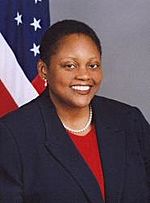Jendayi Frazer facts for kids
Quick facts for kids
Dr. Jendayi Frazer
|
|
|---|---|
 |
|
| 15th Assistant Secretary of State for African Affairs | |
| In office August 29, 2005 – January 20, 2009 |
|
| President | George W. Bush |
| Preceded by | Constance Berry Newman |
| Succeeded by | Johnnie Carson |
| United States Ambassador to South Africa | |
| In office May 25, 2004 – August 26, 2005 |
|
| President | George W. Bush |
| Preceded by | Cameron R. Hume |
| Succeeded by | Eric M. Bost |
| Personal details | |
| Born | 1961 (age 64–65) Virginia |
| Political party | Republican |
Jendayi Elizabeth Frazer is an important American diplomat and expert on Africa. She was the top U.S. official for African affairs, serving as the Assistant Secretary of State for African Affairs. She also taught at Carnegie Mellon University.
Early Life and Education
Jendayi Frazer was born in 1961 in Virginia. She went to Stanford University and earned several degrees. She studied political science and African-American studies. She also received master's degrees in international policy and education. Later, she earned her Ph.D. in political science. During her time at Stanford, she learned from Condoleezza Rice, who later became the U.S. Secretary of State.
Academic and Government Roles
Before joining the government in 2001, Dr. Frazer was a professor. She taught public policy at Harvard University from 1995 to 2001. Before that, she was a professor at the University of Denver. She also edited a journal called Africa Today.
Key Diplomatic Roles
Dr. Frazer held several important positions in the U.S. government. She worked for President George W. Bush.
Ambassador to South Africa
From 2004 to 2005, Dr. Frazer was the United States Ambassador to South Africa. She was the first woman to hold this important role. As an ambassador, she represented the U.S. in South Africa.
Assistant Secretary of State for African Affairs
From 2005 to 2009, Dr. Frazer served as the Assistant Secretary of State for African Affairs. This meant she led the U.S. government's work with countries across Africa.
Helping Africa's Development
During her time in government, Dr. Frazer helped create major programs for Africa.
- She helped start the President's Emergency Plan for HIV/AIDS Relief (PEPFAR). This program provided $15 billion to fight HIV/AIDS in Africa.
- She also helped create the Millennium Challenge Account. This program increased U.S. aid to Africa to a record $4.1 billion in 2006.
- She played a key role in designing policies to help end wars. These included conflicts in the Democratic Republic of the Congo, Sierra Leone, Liberia, and Burundi.
Promoting Peace in Africa
Dr. Frazer is known for supporting peaceful solutions in Africa. She spoke out against armed groups. She encouraged peaceful movements to bring about democratic changes.
Later Career and Activities
After leaving her government roles, Dr. Frazer continued to be involved in international affairs.
Involvement in African Politics
Dr. Frazer often traveled to African countries to help with political issues.
- In 2007, she met with leaders in Somalia to discuss U.S. support for their government.
- In 2008, President George W. Bush sent her to Kenya. She helped try to resolve a political dispute after the 2007 presidential election. She met with both the president and the opposition leader.
- In 2008, she stated that Zimbabwe's opposition leader, Morgan Tsvangirai, had won the election. She believed President Robert Mugabe should step down.
- In late 2008, she was put in charge of issues related to the conflict in North Kivu.
Views on International Relations
Dr. Frazer has shared her opinions on how the U.S. should work with Africa.
- In 2009, she suggested that the U.S. should focus on its strategic interests in Africa. She believed the U.S. should avoid a "tough love" approach.
- In 2015, she criticized the International Criminal Court. She felt it unfairly targeted African leaders.
- In 2016, Dr. Frazer joined many national security experts. They signed a letter expressing concerns about the Republican candidate for president, Donald Trump.
Current Engagements
As of 2023, Dr. Frazer is a distinguished visiting fellow at the Hoover Institute at Stanford University. She is also a member of the Aspen Institute. She serves on the boards of several non-profit organizations. These include the Atlantic Council, The Mastercard Foundation, KBFUS, The Africa Center, and Seedo.
Quotes
Dr. Frazer has often spoken about the importance of peace and development in Africa.
This issue of insurgency is one that continues to trouble me and Africa as a whole. The way forward is development and legitimate opposition, not through picking up arms and insurgency, and it's a message the A.U. needs to make much more loudly to its member states. – Frazer in a press conference discussing instability in the horn of Africa.
 | Roy Wilkins |
 | John Lewis |
 | Linda Carol Brown |

